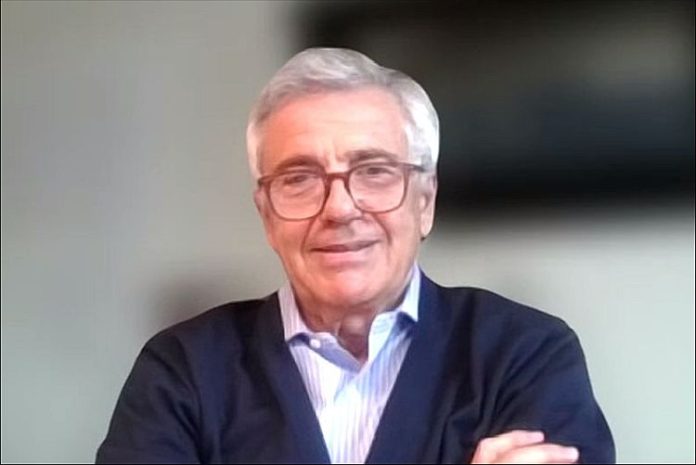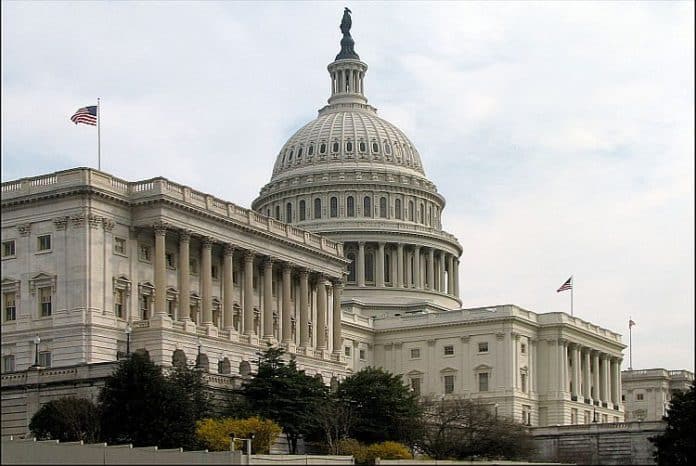★ The Sports Examiner: Chronicling the key competitive, economic and political forces shaping elite sport and the Olympic Movement.★
★ To get the daily Sports Examiner Recap by e-mail: sign up here! ★
≡ IOC PRESIDENTIAL ELECTION ≡
Acceleration. That was the key concept stressed by International Olympic Committee Presidential candidate Juan Antonio Samaranch of Spain, in more than hour of discussion with a worldwide group of reporters online on Tuesday, hosted by the International Sports Journalists Association (AIPS).
Asked about his service, especially as an Executive Board member, in the administration of German Thomas Bach, Samaranch explained with considerable enthusiasm:
“I have seen the extraordinary job, under his leadership, that we have done.
“His motto, when he started, was clear: ‘change or be changed.’ And he went to an accelerated change in the IOC, through Agenda 2020 and 2020+5 to continue to make us relevant in today’s society, that was accelerating itself.
“Well, guess what? My idea, and I think most of us in this call might agree, is that the world continues to accelerate, and what needs to be done for the future is not a revolution, but an extraordinarily rapid evolution of many of our main work lines, because the world continues to accelerate.
“So, I’m not advocating for change just per se, to change, but an acceleration of the change and the rate of change, the rate of adapting ourselves to the reality out there, to society, because we are just part of them.”
He also underlined, as he did in his candidate statement, the need to shift more authority to the IOC members:
“Yes, I think some changes have to be made. I really believe, and it is one of my strong beliefs that the IOC has demonstrated an extraordinary resiliency throughout 130 years of success that led up to wonderful Games in Paris.
“And that is because, I believe, have a very good governance system. We have 100-plus volunteers with no other objective than to make sure that the Olympic values received from the previous generation are passed on, stronger if possible, to the next generation. And this combination of skills, the experiences of these 100 volunteers, I think, confirm a great governance system that has taken us to where we are successfully. …
“We have to give the membership of the Session the powers it needs to continue making the key decisions for our future.”
Samaranch is clearly one of the key contenders in the 20 March election, but with the world in turmoil, why did he decide to run? Essentially because he feels he is ready to lead:
“I’ve had the privilege in my life of being part of the Olympic Movement for a long time, having been an IOC member for 24 years and I have been able to participate in this extraordinary life experience together with so many interesting people.
“Right now, at that moment in my life, where I have a long experience, both in managing and dealing with all the things that the Olympic Movement has to deal with every day, and also I have a very strong experience, life experience, professionally in the world of business, the world of finance. I think, having reached this point of my life, where I have the energy, the stamina, the willingness to do it, and the combination of experiences, it is my time to try to contribute my views and my ideas for the future of the Olympic Movement.”
Told by one reporter that he was a favorite in the race, Samaranch had to keep from laughing:
“It mesmerizes me that people can have an idea of what the result is going to be. I have no clue.
“So I have not looked at any and I wish good luck to anybody who wants to bet on those things. It is for insiders, it is practically impossible to predict what the result will be; imagine for outsiders!”
He was asked about how his father’s legacy – Juan Antonio Samaranch was a transformational IOC President from 1980-2001 – impacts him and the race, the answer was clear for the younger Samaranch, now 65:
“None of the challenges they faced, none of the recipes that they had to use to get along, have any resemblance of the challenges or the recipes of today. So, unfortunately, there is no connection; these is nothing from there that can be applied today. … This is a completely different ballgame.”
There were many questions on the issues in front of the Olympic Movement and the IOC:
● His priorities if elected:
“The first and most important thing … it’s a simple and successful, relevant and reliable Olympic Games. Period. Without that, there is no universality, without that, there is no financing, without that, there is no pyramid of world sports, everything crumbles down.
“So we have to continue with adapting the program, we have to continue adapting how we do it, we have to make sure we select the right host cities. We have to go to the success of Paris, day in and day out. That is what is going to keep our Movement strong.
“Once you have that, we have to fight for universality, of course, I said it before. Without that, we are nothing. There is no reason to be for the Olympic Movement if we haven’t the inspiration that people, that humanity, have much more in common than not.
“Then I think it is necessary that we enhance our work on finance. We have a very good finance and revenue model with the broadcasting partners, now with the digital included. We have a very good thing with the TOP sponsors, but we need to modernize all those things for new technology. We need to bring new sources of revenue, because it’s not that we are greedy and we want more money. There is no limit to the amount of money to be invested in promoting the base of the sport.”
● On the spread of Olympic venues in the name of sustainability and cost containment:
“Every time we come [to this question], to the best of our ability, I think that compactness is better being dispersed, by a principle. We accepted and promoted dispersion to make sure that we have countries, cities and territories to organize the Olympic Games, and don’t make foolish investments in venues that might have not legacy for the people in that territory in the future. And we will continue to do that.
“But if I am president, decisions on dispersion will have to be made for very serious reasons, because there is no [existing] venue, or there is some sound decision, even it can be a strategic decision of promotion of a sport, but it would have to be the exception and not the rule.
“I think very strongly that we have to protect the essence of the Olympic Games. It’s what makes our thing magic. … And the most important symbol is the Olympic Village.”
● On prize money in the Olympic Games:
“I strongly agree that the champions and the sportsmen that make a living out of that, that they become the living and moving inspiration for the youth of the world, they have to be very well compensated and they have to be very successful in their lives.
“But they have the National Olympic Committees, their sponsors, their countries, to gratify them for their successes. And the World Championships and the World Cups in their own specialties.
“The Olympic Games, sorry, to me, are different. The Olympic Games, in the pinnacle of the world sports pyramid, up there at the top of the pyramid, we have the Olympic Games, that they have generated in the last quadrennial, 7.6 billion U.S. dollars. That money goes back to the base of the pyramid, through financing the next organizing committees, through the National Olympic Committees, through the International Federations and through our Solidarity programs.
“I think that taking any money that we take from that filtering-down to the base of the pyramid, to make it broader, if possible, to compensate to the current, today’s champions, I think it’s unnecessary because they are compensated enough at the Olympic Games. And I think that money has to be used to flatten the curve and make the Olympic Games more accessible for more people.
“Bear in the mind that those champions today, of six months ago in Paris, they were young kids 12 years ago, when other champions did not have prize money. And the money they could have claimed went down through the pyramid to pay for the buses that had to be rented to take them as kids to regional competitions, to take them to buy new equipment for the gym in their neighborhood and all that doesn’t come from thin air. All that basically comes, in today’s organized sports world, with few countries [as] exceptions, from the revenues of the Olympic Games.”
● On protecting the women’s competition category:
“It’s pretty straightforward. Five years ago, when we started dealing at the Executive Board of the IOC with this problem, the idea – and it was very well thought of – was women’s sport has to be safe and fair. Since safety and fairness would be different for different sports – it’s not safe and fair, the same thing, at table tennis or boxing – we passed on to the federations how to execute that safe and fair proposition.
“But no matter what we want, it’s the reality what counts. And reality is that in Paris, we saw that the social alarm about transgenderism and about not only about transgender, but about DSD [differences in sex development], this has been there and the world is expecting from the IOC what we have claimed so long: the leadership in the sports world.
“So, if I make it there to the presidency, I will make sure that it will be the IOC to lead, across the board the decision on how the women’s sport has to be kept safe and fair, and we will do that immediately and we will base that on scientific evidence that is abundant nowadays.”
Samaranch also made a remarkable statement on the difference between the Olympic Games and everything else in the sports world:
“It is very, very different the Olympic competition than the world championships. And the difference is that the people who follow the Olympics has very little to do with sports fans. Most of them, mostly women by the way, most of the people watching the Olympic Games are people that would normally not watch sports competitions.
“They watch the Olympics for the values. For the personal stories of improvement, of becoming better, of fighting against difficulty, for very healthy national pride. That is the difference, and the value of the same competition, in most Olympic sports, of a world championship, of that same competition, same heroes, same everything, under the Olympic Rings, it goes between five and 20 times difference in value.
“So whatever we do in our Olympic Games, we have to preserve, above everything else, that they are a special thing and they are Olympics.”
Observed: Samaranch came across with a notable, relaxed warmth and an enthusiastic vision of what can be in the future, the near future, under his leadership.
His clear command of where the Olympic Movement is and where he wants to go has made him a convincing candidate and he is one of the real contenders for the office.
But, as he said, the issue will be decided by about 100 people in a ballroom of a resort in Costa Navarino, Greece on 20 March. How it will turn out will depend, inevitably, in the level of trust and belief that the IOC members have in each candidate.
Samaranch’s enthusiasm, experience and expertise makes him a prime contender.
¶
★ Receive our exclusive, weekday TSX Recap by e-mail by clicking here.
★ Sign up a friend to receive the TSX Recap by clicking here.
★ Please consider a donation here to keep this site going.
For our updated, 895-event International Sports Calendar for 2025 and beyond, by date and by sport, click here!

























